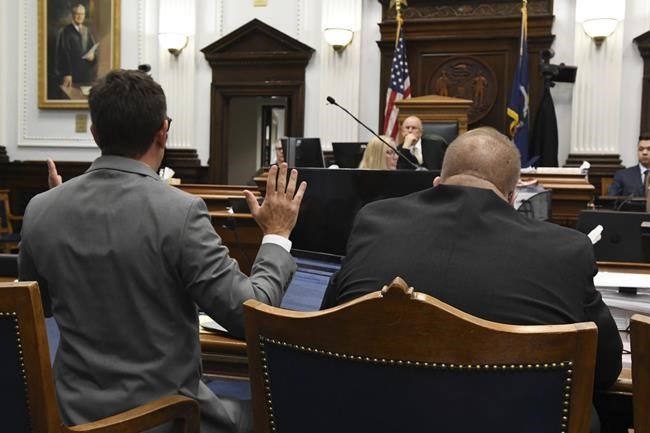KENOSHA, Wis. (AP) ŌĆö Sobbing so hard at one point that the judge called a break, Kyle Rittenhouse took the stand at his murder trial Wednesday and said he was under attack when he shot three men during a night of turbulent protests in Kenosha.
ŌĆ£I didnŌĆÖt do anything wrong. I defended myself,ŌĆØ he said
Rittenhouse, 18, is on trial on charges of killing two men and wounding a third during a chaotic protest in the summer of 2020 that was set off by the wounding of a Black man by a white Kenosha police officer.
He could get life in prison if convicted of the most serious charges against him.
Rittenhouse, who was 17 at the time, went to Kenosha with an AK-style semi-automatic weapon and a medic bag in what he said was an attempt to protect property from rioters who had set fires and ransacked businesses in the two preceding nights.
Rittenhouse said he fatally shot Joseph Rosenbaum after Rosenbaum chased him and put his hand on the barrel of Rittenhouse's rifle. Then he shot and killed Anthony Huber, testifying that he opened fire after Huber struck him in the neck with his skateboard and grabbed his rifle.
When a third man, Gaige Grosskreutz, ŌĆ£lunges at me with his pistol pointed directly at my head,ŌĆØ Rittenhouse shot him, too, wounding him.
ŌĆ£I didnŌĆÖt intend to kill them, I intended to stop the people who were attacking me," Rittenhouse said.
Much of the testimony was centered on the first shooting of the night, since it was Rosenbaum's death that set in motion that bloodshed that followed.
Rittenhouse said he was walking toward a Car Source lot with a fire extinguisher to put out a fire when ŌĆ£I hear somebody scream, ŌĆśBurn in hell!ŌĆÖ And I respond with ŌĆśFriendly, friendly, friendly!ŌĆÖŌĆØ
He said Rosenbaum was running at him from one side and another protester with a gun in front of him, ŌĆ£and I was cornered." He said that's when he began to run.
He said another protester, Joshua Ziminski, told Rosenbaum, ŌĆ£Get him and kill him.ŌĆØ
Rittenhouse said he heard a gunshot directly behind him, and as he turned around, Rosenbaum was coming at him with his arms out in front of him. ŌĆ£I remember his hand on the barrel of my gun," Rittenhouse said.
ŌĆ£I shoot him," he recounted. He also said he thought the object Rosenbaum threw during the chase ŌĆö a plastic hospital bag ŌĆö was the chain he had seen Rosenbaum carrying earlier.
Rittenhouse said he intended to help Rosenbaum but was in shock as someone else attended to him. Rittenhouse said he thought the ŌĆ£safest optionŌĆØ was to turn himself in to police who were on nearby.
When defense attorney Mark Richards asked Rittenhouse why he didnŌĆÖt keep running away from Rosenbaum, he said: ŌĆ£There was no space for me to continue to run to.ŌĆØ
Rittenhouse said that earlier that night, Rosenbaum was holding a chain and had twice threatened to kill him.
Apologizing to the court for his language, Rittenhouse said Rosenbaum was walking down the street with the chain and screamed, ŌĆ£If I catch any of you (expletives) alone IŌĆÖm going to (expletive) kill you!"
And later that night, he testified, Rosenbaum said: ŌĆ£IŌĆÖm going to cut your (expletive) hearts out! Rittenhouse said Rosenbaum also called them ŌĆ£N-words." But he said he didn't want to repeat the word in court.
As he first took the stand, Rittenhouse responded no when asked by his attorney whether he came to Kenosha looking for trouble.
Rittenhouse testified that he saw videos of violence in downtown Kenosha on Aug. 24, 2020, the day before the shootings, including a brick being thrown at a police officer's head and cars burning in a Car Source dealership lot.
Rittenhouse said the Car Source owner ŌĆ£was happy we were there.ŌĆØ
RittenhouseŌĆÖs decision to testify came despite several legal experts saying that an underwhelming prosecution case had made it less likely he would need to do so.
Prosecutors used 5 1/2 days of testimony to try to portray Rittenhouse as the aggressor on the night of the shootings. But the prosecutionŌĆÖs witnesses often bolstered the young manŌĆÖs claim of self-defense, including his fear that his weapon would be taken away and used against him.
The jurors were sent out of the room just before Rittenhouse began testifying while the judge explained his right to remain silent and the potential risks of testifying, Rittenhouse repeatedly answering that he understood.
As jurors reentered the room, they filed by Rittenhouse on the stand. As Rittenhouse began answering questions, some jurors appeared to take extensive notes on their clipboards.
___
Bauer reported from Madison, Wisconsin; Foody from Chicago. Associated Press writer Tammy Webber contributed from Fenton, Michigan.
___
Find APŌĆÖs full coverage on the trial of Kyle Rittenhouse at:
Michael Tarm, Scott Bauer And Kathleen Foody, The Associated Press
